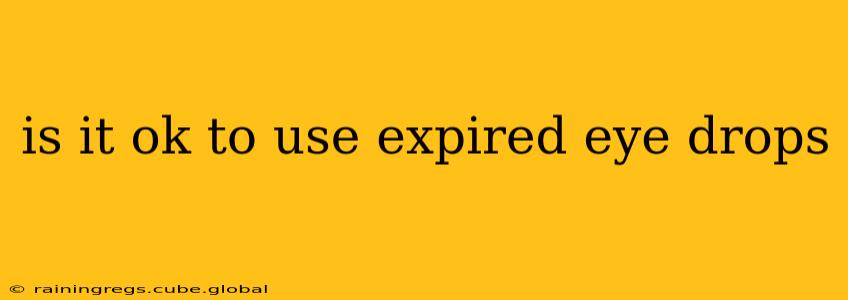Using expired eye drops might seem like a harmless way to save money, but it's a risk you shouldn't take. While it might seem okay if the drops still look and smell normal, using expired eye drops can expose your eyes to potentially harmful bacteria and contaminants that have grown in the solution over time. This can lead to a range of eye infections and complications. Let's delve into the details and address some common questions.
What Happens When Eye Drops Expire?
Eye drops, like many medications, have preservatives that help prevent bacterial growth. However, these preservatives aren't foolproof, and their effectiveness diminishes over time. Once the expiration date passes, the risk of bacterial contamination increases significantly. This means that instead of soothing and relieving your eyes, you could be introducing harmful microorganisms that can cause:
- Eye infections: These can range from mild irritation and redness to serious conditions like conjunctivitis (pink eye) or keratitis (inflammation of the cornea).
- Allergic reactions: The breakdown of preservatives and the presence of bacteria can trigger allergic reactions, leading to itching, swelling, and increased discomfort.
- Vision impairment: In severe cases, untreated eye infections can lead to vision problems or even permanent damage.
Can I Tell If My Eye Drops Are Bad?
You can't reliably tell if expired eye drops are contaminated just by looking at them. They might still appear clear and smell normal, but harmful bacteria are often invisible to the naked eye. Never rely on visual inspection to determine the safety of expired eye drops.
How Long Are Eye Drops Good For After Opening?
Even unopened, eye drops have an expiration date. After opening, the shelf life is generally shorter, often around 4 weeks. Check the label for specific instructions as this can vary by brand and type of eye drop. Always discard your eye drops after this time, even if they appear perfectly fine.
What Should I Do If I Accidentally Used Expired Eye Drops?
If you accidentally used expired eye drops and experience any symptoms such as redness, irritation, pain, blurry vision, or excessive discharge, seek immediate medical attention from an ophthalmologist or your doctor. Early treatment is crucial to prevent complications.
Are There Any Exceptions to Expired Eye Drop Use?
No. There are no exceptions. The risk of infection far outweighs any potential benefits of using expired eye drops. It's simply not worth the risk to your eye health.
How Can I Avoid Using Expired Eye Drops?
- Check expiration dates: Always check the expiration date before using any eye drops.
- Proper storage: Store eye drops according to the manufacturer's instructions, usually in a cool, dry place.
- Labeling: Write the date you opened the bottle on the label to help you remember when to discard them.
- Don't share: Never share eye drops with others, as this can spread infection.
In conclusion, the safety of your eyes is paramount. Don't risk using expired eye drops. The potential consequences are simply too serious. Always discard expired eye drops and use a fresh bottle when needed. Your vision is worth it.
